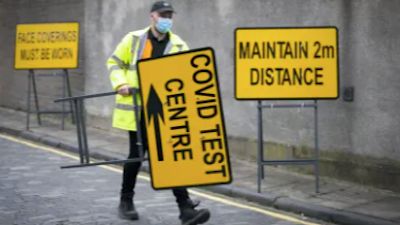Covid: How many cases of the Indian variant are there in the UK and which areas are most affected?

Cases of the Indian Covid variant are rising - up by more than 160% in the week to May 19 - and several areas of England have been put under new restrictions in a bid to curb a surge in infections in these clusters.
There are concerns the variant could be fuelling a third wave of coronavirus - government scientists and public health advisors have long warned the UK risked a third wave as Covid restrictions lifted and society opened up, and that a wave would be exacerbated by the Indian variant.
Which areas are being hardest hit by the Indian variant, could it put the UK on the cusp of a third wave and and what impact is it having on hospital admissions?
India Covid variant: What do we know about the latest coronavirus 'variant of concern'?
Covid: How worried should we be by the rise in cases of the Indian variant?
Where in the UK is the Indian variant?
Official guidance was updated to advise against all but essential travel to areas where the Indian variant is growing fastest.
Eight areas have been identified in England as being Indian variant hotspots. They are:
Bolton
Leicester
Kirklees
London borough of Hounslow
Blackburn with Darwen
Burnley
North Tyneside
An increase in infections in Glasgow may also be fuelled by the variant.
Seven cases were also identified in Northern Ireland and in late April, eight were found in Wales.
Across the UK, there have been more than 5,000 cases of the B.1.617.2 variant in England, 383 in Scotland, 62 in Wales and 15 in Northern Ireland.
Covid-19 case rates in Bolton are now at their highest level for more than six months, latest figures show.
A total of 1,300 new cases of coronavirus were recorded in the seven days to May 21 – the equivalent of 452.1 cases per 100,000 people. This is up from 300.8 the previous week and is the highest since the seven days to November 12.
Bolton continues to have the highest rate of new Covid-19 cases in the UK.
There are 43 people in hospital with Covid-19 in Bolton. The Royal Bolton said on Tuesday they had 41 inpatients with Covid, including eight in critical care.
Blackburn with Darwen has the second highest rate, up week-on-week from 130.9 to 301.9, with 452 new cases.
Bedford has the third highest, up week-on-week from 128.1 to 193.9, with 336 new cases.
How many of these infections are the Indian variant is not known.
What is the Indian Covid variant?
The India variant, or as it is known officially, B.1.617.2, (although there are several variants originating in India) is one of four mutated versions of coronavirus which have been designated as being "of concern" by UK public health bodies, along with the variants first identified in Kent, South Africa and Brazil.
What are the restrictions in the areas affected by the Indian variant?
People in these areas have been advised not to meet others indoors or travel in or out of the location.
People should avoid travelling into and out of the hotspots while residents in the eight areas – nearly two million people – should also be tested twice a week, according to the government advice.
Will the vaccine work against the Indian variant?
With over 70% of the UK population having now received at least one dose of a Covid vaccine, it is hoped that the link between cases and hospitalisations and deaths has slowed.
The good news is that a study by Public Health England has found two doses of the Pfizer and AstraZeneca Covid-19 vaccines are almost as effective against the Indian coronavirus variant as they are against the Kent variant.
The Pfizer/BioNTech jab is 88% effective against the Indian variant after two doses, while the University of Oxford/AstraZeneca vaccine has an efficacy of 60%, data from PHE concluded.
Although the vaccines were found to be only 33% effective three weeks after the first dose.
Infections with the Indian variant have been highest in younger adults and children who have not yet been offered a vaccine.
Coronavirus: What you need to know - Listen in for the latest information, advice and analysis on the pandemic
Hospital admissions are also rising.
For the first time since the winter lockdown weekly hospital admission have stopped falling. There were 797 in hospital with Covid as of Monday; just two days earlier, on May 22, there were 730.
Of the five hospital trusts with the highest Covid admissions, four of them are in areas where the Indian variant is prevalent.
If admissions don’t fall below 730 (and it is likely that they will not) then they will have plateaued well above the lowest admissions figure of 451 on September 2.
Cases, too, are climbing. In the week to May 24, there have been 18,179 positive cases recorded, up 17% on the previous week.
Is the Indian variant more infectious?
So far, there is no evidence that it causes more severe disease or renders the vaccines less effective. But there is some suggestion it is easier to catch.
ITV News Science Editor Tom Clarke says: "By nearly all estimates this suggests the virus is definitely more transmissible than the Kent strain.
"Possibly as much as 50% more. If that is the case, we’re in serious trouble. But even 20 or 30% greater transmissibility could be serious."